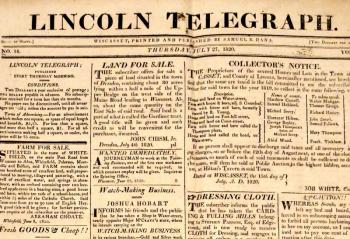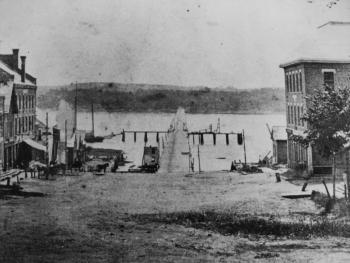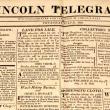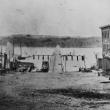Once upon a time, there was the Lincoln Telegraph
 A portion of the Lincoln Telegraph, an early Wiscasset newspaper that resident Steve Christiansen shared.
A portion of the Lincoln Telegraph, an early Wiscasset newspaper that resident Steve Christiansen shared.
 One of the oldest photographs of Wiscasset village taken not long after the Rundlett Block shown at the right was constructed in 1871, 50 years after the final edition of the Lincoln Telegraph was printed.
One of the oldest photographs of Wiscasset village taken not long after the Rundlett Block shown at the right was constructed in 1871, 50 years after the final edition of the Lincoln Telegraph was printed.
 A portion of the Lincoln Telegraph, an early Wiscasset newspaper that resident Steve Christiansen shared.
A portion of the Lincoln Telegraph, an early Wiscasset newspaper that resident Steve Christiansen shared.
 One of the oldest photographs of Wiscasset village taken not long after the Rundlett Block shown at the right was constructed in 1871, 50 years after the final edition of the Lincoln Telegraph was printed.
One of the oldest photographs of Wiscasset village taken not long after the Rundlett Block shown at the right was constructed in 1871, 50 years after the final edition of the Lincoln Telegraph was printed.
Let us travel back in time to before Facebook, Instagram, YouTube, television and radio. We’ll stop the clock 200 years ago at 1820. If you lived then, you got your news by word-of-mouth and from newspapers.
That spring, Samuel B. Dana, a printer by trade, decided Wiscasset needed its own newspaper. It had been 12 years since The Republican, the town’s previous newspaper, printed its final edition. Dalton was determined to start his own newspaper and did so, naming it the Lincoln Telegraph. Maybe he chose that name in honor of the Wiscasset Telegraph, the community’s first newspaper. It was printed from 1796 to 1798.
Dana printed his four-page newspaper on a hand-cranked press he bought from John Babson and Enoch Rust, publishers of the Eastern Repository, yet another Wiscasset newspaper, printed from 1803 to 1807.
The Lincoln Telegraph came out on Thursday morning. It sold for $2 per annum, “exclusive of postage; one dollar payable in advance.” Alas, Dana was not very successful as a businessman; his newspaper folded after 18 months. Its final edition came out in October 1821.
Returning to the present, I know of just one surviving copy of the Lincoln Telegraph. Wiscasset’s Steve Christiansen of Willow Lane has the edition printed on July 27, 1820. He was kind enough to let me copy it to share with Boothbay Register-Wiscasset Newspaper readers.
Something making the Lincoln Telegraph unique from other news publications of the mid-19th century was it featured mostly advertisements on its front page, most from Wiscasset merchants. One promises Fresh GOODS & Cheap! at Henry Clark’s warehouse on Fore Street. There is an assortment of British muslins, men’s shirts, ladies’ black and white silk gloves and silk hosiery, plus woolen yarns, flannels and cottons, too. Also offered is a selection of fine brandies, rum and wines, teas and coffee, sugar and molasses. It seems like there was nothing Clark did not sell. Other items included a supply of raisins, bushels of fresh yellow corn, rye, flour, fancy crockery, fine glassware, farm tools and tobacco including cigars and snuff.
Another advertisement is for 80 acres of land or there about for sale in Dresden. The property is “within a half mile of the Upper Bridge on the west side of the Maine Road leading to Wiscasset” – John Chism Jr. of Dresden is the seller.
There is also this curious announcement: “CAUTION!! WHEREAS Sarah, my wife, has left my bed and board, and behaved in an unbecoming manner. This is to forbid all persons harboring or trusting her on my account, as I am determined not to pay one cent of her contracting after this date. JOSEPH LANCASTER Woolwich, June 11th, 1820.”
The Lincoln Telegraph announces to its readers it has copies of a newly printed pamphlet to sell, titled: the Life of Michael Powers, an Irish immigrant found guilty of murder and hanged in Boston. The pamphlet includes a transcript of the trial before Massachusetts Supreme Court. Powers was defended by none other than Daniel Webster, the famous attorney and statesman. But not even Webster could save Powers, who dispatched his victim with a broad ax and buried him in the cellar. The Telegraph was asking 12 and a half cents for the pamphlet. Fast forward to 2021 and you will see original copies of the Life of Michael Powers advertised online for as much as $650.
The latest news appeared on the Telegraph’s inside pages, nearly all of the copy having been gleaned from other publications. Dana seemed to have had a taste for mayhem; this issue includes a colorful report on the double hanging of two men for the murder of a U.S. Mail carrier near Baltimore. Another shares details of the murder of a baker from New Albany. There are also accounts of a reported suicide, a case of bigamy, and an attempted robbery of the toll taker on the Hackensack Bridge. Another report warns of counterfeit two-dollar bank notes in circulation in Worcester, Massachusetts.
The last item concerning the bank notes is curious since there had been a national currency in use for more than 20 years. The Lincoln Telegram advertisement of Charles Wilkins, seller of cod, pollock, hake and also of wooden shingles says he is accepting “Wiscasset money – if offered immediately.”
Unfortunately, we do not get much Wiscasset news in the Telegraph except for a list of arrivals and departures of merchant ships at the Port of Wiscasset. Included is the arrival of the ship Africa in 42 days from Liverpool, England under the command of Alexander Johnston with a cargo of salt and coal. The Johnston family owned the Africa and was engaged in the cotton trade. Raw cotton was shipped from southern states to England. The cargo on the return voyage included iron, coal and salt. Five years later, the Africa sank, possibly off Cape Cod, with all hands lost.
Dana started his newspaper at the lower end of Water Street near or on Union Wharf. That makes perfect sense since the harbor was certainly the place news of the world arrived first. Over the years, Wiscasset has been home to at least 18 newspapers, all weeklies.
Special thanks to Steve Christiansen for sharing his historical newspaper with our newspaper.
Event Date
Address
United States


























